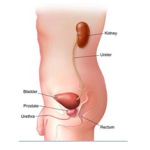When a patient has kidney function of less than 15% of normal due to irreversible kidney disease and he requires dialysis, he/she is said to have reached End Stage Renal Disease (ESRD).
1.What is ESRD?
When a patient has kidney function of less than 15% of normal due to irreversible kidney disease and he requires dialysis, he/she is said to have reached End Stage Renal Disease (ESRD).
2.What is the incidence of ESRD?
In India is approximately 150 - 200 per million populations. Global incidence of chronic kidney failure in children is five per million children (under the age of 12 years) per year.
3.Urinary Tract Infection (UTI) in Children
1% to 3% of children before the age of 14 years will have UTI. UTI is diagnosed in 5% of children less than 2 years presenting with fever. 60% of girls and 20% of boys suffer from recurrent UTI after the first episode
4.Early Detection
Kidney related problems in a growing fetus can be picked up during a routine abdominal ultrasound of the pregnant women. If a detailed follow-up is done, throughout the intrauterine life of the affected baby, soon after its birth, defects can be corrected.
Infections of the kidney early in life (within 2 years) if left unidentified and improperly investigated and treated would lead to scarring and irreversible damage. The symptoms pertaining to Kidney diseases in children could be in the form of failure to thrive, vomiting, pallor (anemia), and growth retardation. A high index of suspicion is necessary to diagnose urinary tract infections and renal problem in children
5.Causes of ESRD
Commonest cause of ESRD is Diabetes Mellitus; it accounts for 30%-40% of patients with ESRD. The other common causes in India are hypertension (14%–22%) and chronic glomerulonephritis (16%-20%).
Acute Kidney failure can occur following severe infection, severe diarrhea and vomiting with dehydration, extensive burns, poisoning with toxic chemicals or drugs or as an allergic reaction to certain medication and this is often a temporary situation. Here, often- timely treatment can retrieve the kidneys to near normalcy.
Chronic Kidney Failure occurs due to immunological disease affecting the kidney (Chronic Glomerulonephritis), Diabetes Mellitus, Hypertension, Genetic diseases affecting the kidney (Polycystic Disease), block to the urinary passage for a prolonged period of time.
Children also suffer from ESRD. In this patient population, the most common causes of renal failure are obstructive nephropathy (conditions causing obstruction to urinary flow that subsequently results in impaired kidney function), reflux nephropathy (impaired kidney function resulting from backflow of urine from urinary bladder into the kidneys) and chronic glomerulonephritis. These three accounts for 75% of cases of ESRD
6.Treatment for ESRD
The options include maintenance hemodialysis (MHD), continuous ambulatory peritoneal dialysis (CAPD) and renal transplantation (RT).
Only 10% of new ESRD patients undergo one of these treatment options; 69% undergo MHD, 15% CAPD and 16% RT. Cost of dialysis per month could sometimes amount to the entire family income per month or even more than that.
Most of the kidney diseases in children are due to common treatable causes. The main advantage in a child’s kidney is that as a growing kidney, it has got the capacity to recover if timely treatment is administered. Whereas an adult kidney in which the process of damage had commenced in early childhood, but went undiagnosed, can succumb to irreversible damage.
That an adult kidney (either from a living or cadaver donor) can be transplanted to a child who has suffered irreversible kidney damage due to ESRD.
A girl child, who undergoes a kidney transplant, can have a normal growth phase, including ‘Menarche’– the onset of menstrual cycles.
Children cannot be subjected to repeated MHD because the blood volume is naturally less and the blood vessels are small. So CAPD is a better option
7.How you can help?
Partner us in our awareness campaign and lend a helping hand to.
- Distribute promotional & publicity material
- Spread our message through interpersonal contacts
- Sponsor advertisements in mass media
- Display posters and banners at important gatherings
Create awareness on the importance of organ donation
How you can be involved in the program for educating & creating awareness on prevention & management of kidney diseases?
- Management of diabetes & hypertension and its relevance with kidney problems
- Importance of organ donation
Reference
- The incidence of end-stage renal disease in India: A population-based study. Kidney International 2006: 70, 2131–2133
- Diseases of Kidney and urinary tract by R.W.Schrier 8th edition

